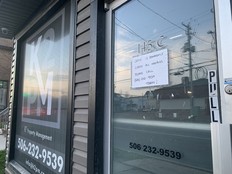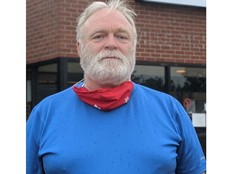Greece wants Canadian LNG, but it won't refuel Atlantic export debate: experts
Experts say key stumbling blocks in building multibillion-dollar export terminals on east coast remain

Article content
The prime minister of Greece is pitching his country as a major European market for Canadian liquefied natural gas.
But it shouldn’t refuel calls for LNG projects in Atlantic Canada to push ahead, according to experts who say key stumbling blocks in building multibillion-dollar export terminals on the East Coast remain.
In what is the first visit by a Greek prime minister to Canada in four decades, Kyriakos Mitsotakis grabbed headlines in a CTV Question Period interview when he said Greece is “very interested in obtaining LNG at competitive prices” that it could ship to Eastern European markets, including Ukraine, with Canada as an ideal supplier.
“As fast as we go in terms of our renewal penetration, we will still need a reliable source of electricity,” Mitsotakis said, noting Greece lacks nuclear power.
“That leaves LNG for the foreseeable future as a significant source of energy for the production of energy.”
The words make Greece the latest country, following Germany and Japan, to express interest in buying LNG from Canada.
That’s despite proposed export projects on the east coast either stalled or dead.
“Canada, out west, has an abundant source of gas, but to get that to the East Coast is very difficult due to pipeline constraints,” said Paul MacQueen, vice president of trading at Energy Atlantica, a Halifax-based energy trading company. “But you really need to build out the pipelines to be able to supply the East Coast with more gas.”
But MacQueen continued that it’s cost prohibitive to do so, and companies can’t simply build on the prospective interest of potential customers.
“Without a signed contract, no one is going to put shovels in the ground to spend the billions needed to build an export facility,” MacQueen said. “No one is going to put shovels in the ground for a billion-dollar guess on if Greece is going to accept the East Coast of Canada.”
Andrew Leach, co-director of the Institute for Public Economics at the University of Alberta, joked in a series of social media posts on Monday that forecasting European demand for natural gas ultimately brought on by Russia’s war on Ukraine is revisionist history.
“If she would have built that house five years ago, I would have definitely rented it this weekend,” Leach said, in response to the Greek prime minister’s words. “Did you offer to sign a lease on the house? No. Wasn’t prepared to make a commitment like that.”
Spanish energy giant Repsol announced last March it was abandoning plans to build a multibillion-dollar liquefied natural gas terminal in Saint John, citing the cost of shipping gas across the country.
“Following a study carried out by the company, it was determined to not continue with the Saint John liquefaction project as the tolls associated to it made it uneconomical,” Repsol spokesperson Mike Blackier said.
Calgary’s Pieridae Energy Ltd. also mothballed its proposed Nova Scotia export terminal citing cost pressures, after it asked the federal government for nearly a billion dollars.
Both Repsol and Pieridae did not return requests for comment on Monday.
Meanwhile, a series of conservative politicians are lamenting an opportunity lost.
“It’s time for Justin Trudeau and the Liberal-NDP alliance to get out of the way,” Alberta Energy Minister Brian Jean said on social media on Monday.
“With massive natural gas reserves, Canada can no longer wait on the LNG sidelines, burdened by an onerous regulatory system. Our allies and trading partners need us. We must have more LNG export facilities approved and built.”
Conservative Leader Pierre Poilievre argued in New Brunswick last week that Canada needs to fast-track permitting for LNG facilities, pledging to do so if his party forms government.
At a rally this past weekend in Ottawa, Poilievre again made comments similar to a persistent push by Premier Blaine Higgs to see Canada ship gas to replace both coal plants in Asian countries and eliminate Europe’s dependence on Russia.
In a trip to Saint John two years ago, Deputy Prime Minister Chrystia Freeland said that her government had a “political responsibility” to help move Europe off Russian energy dependence, and that “there is a role for the federal government” to help see an LNG export terminal built.
Federal Natural Resources Minister Jonathan Wilkinson then confirmed that the government was actively speaking with German officials and industry.
But LNG then took a back seat amid the high-profile signing of an agreement to sell Canadian-made hydrogen to Germany when German Chancellor Olaf Scholz visited last summer.
During that trip, Prime Minister Justin Trudeau said that “there has never been a strong business case” for LNG terminals on the east coast, due to the difficulty of sourcing a supply.
Specifically, it’s the distance between Alberta gas fields and New Brunswick.
Wilkinson told Brunswick News last fall that efforts were being made to see if that could be overcome.
“The issues around an LNG export facility, in New Brunswick particularly with the Repsol facility, are certainly live conversations that we’re having with the Germans,” Wilkinson said. “We have been working with the proponent and the pipeline company, as well as talking with the Germans about the potential.
“The challenge is moving gas all the way from Alberta to New Brunswick and having to make a number of upgrades to existing pipelines, the costs of which would have to be borne by the gas that would be going to the export facility.”
Wilkinson continued that it would likely mean selling the gas at a higher price.
“That’s the conversation with the Germans that are going on with the company, about whether there is an opportunity to put in place a framework that would allow the economics to work,” he said.
Repsol’s study ultimately concluded that it’s not economical.
“They keep renewing their export permits, but that’s just so that they have the piece of paper that says ‘we can’ if and when it ever happens,” MacQueen said. “They’re keeping the option open even though the open is a very low probability.”












Postmedia is committed to maintaining a lively but civil forum for discussion. Please keep comments relevant and respectful. Comments may take up to an hour to appear on the site. You will receive an email if there is a reply to your comment, an update to a thread you follow or if a user you follow comments. Visit our Community Guidelines for more information.